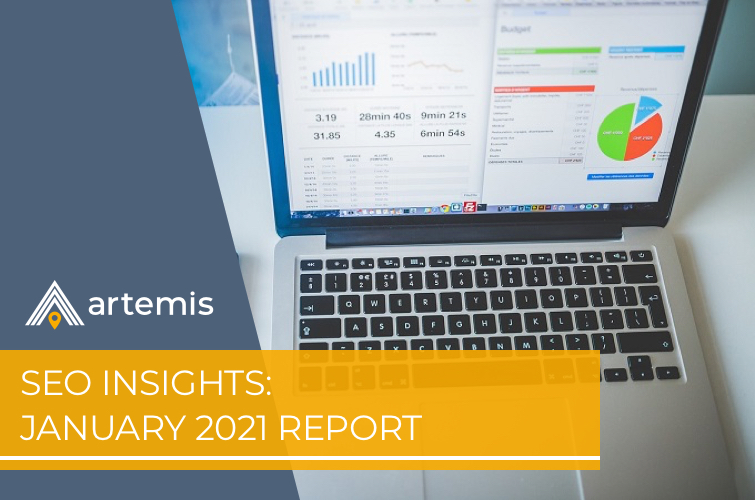SEO Insights – January 2021 Report

Following the disruptive Core Update that Google rolled out in December, January was a relatively quiet month for search updates and if anything, we saw a slight rollback to the Core Update.
This is quite typical behaviour from Google that we’ve witnessed over the years; legitimately good websites and pages can often be adversely affected by updates. There always appears to be a correcting and “unwinding” of the intensity of an update as Google identifies these “errors” and the updates are fully rolled out.
Dynamic Search Intent
2020 was such a strange and unique year that it highlighted some of the intricacies of Google’s algorithm which perhaps weren’t so easy to witness previously. One of these areas is the evolution of how Google dynamically adapts its search results based on how it perceives the intent behind a search term.
It means that a page that at some point ranks for a given search term can quickly lose rankings and be replaced by other pages if Google deems that the intent behind that search term has now changed.
Google’s perception of the intent behind a search term can seem to change quite quickly and its algorithm is swiftly able to detect and adapt to these changes in search behaviour.
From an SEO perspective is means that we need to be constantly monitoring and adapting to what Google now expects the search results to be for a given search term. Static pages of content are, therefore, likely to lose rankings if they are not kept up to date with what a user ultimately expects to see when searching.
Keeping pages up to date, current and relevant has become more important than ever and is going to be a consistent and necessary SEO activity going forward.
Over-Optimisation
We have highlighted this in our previous monthly search updates but we are seeing again that pages which are seemingly over-optimised when compared to competing pages can rank much lower than they theoretically should do.
Over-optimisation of pages causes Google to lose trust in the pages for the terms which are mentioned too many times relative to other competing pages.
In these cases, less is very much more. Winding back the optimisation can often return pages to their actual and deserved ranking position.
Text Position Prioritisation
We are currently running an R&D project to assess the impact on rankings for search terms dependant on their positions on pages. With the move to mobile-first indexing, the prioritisation of where keywords appear on pages appears to be more important than before Google made this change.
Initial findings show that elevating the mention of keywords on pages can improve the rankings of those pages for related search terms.
This is a significant area of focus at the moment and it will mean that we will likely be changing the position of content elements on pages to further improve rankings for target search terms.

